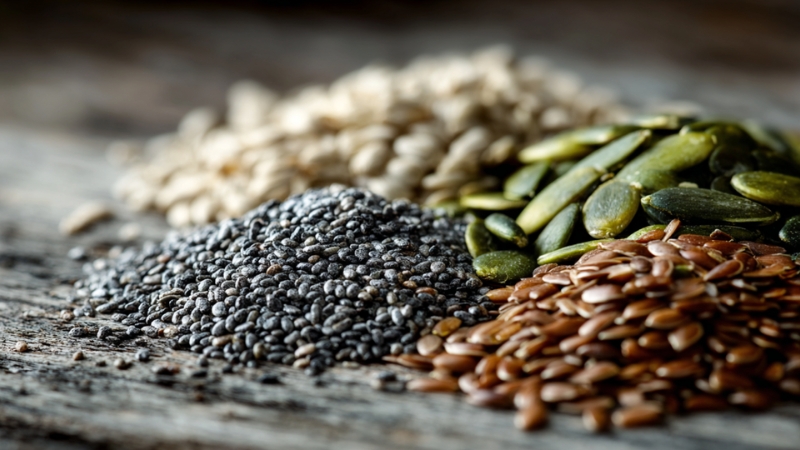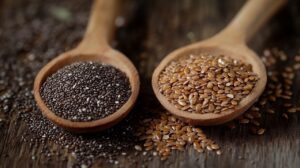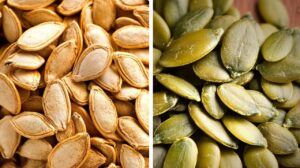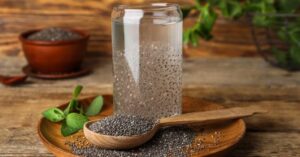After years of monthly mood swings that left me feeling like a stranger in my own body, I discovered something remarkable in my kitchen pantry.
The best seeds for hormonal balance in women had been sitting right there beside my morning coffee, waiting to transform my cycle from chaos to calm.
Research shows that specific seeds contain powerful compounds that can naturally support hormone production and regulation throughout every phase of a woman’s life.
In the sections ahead, you will learn exactly which seeds provide the most benefit for different hormone concerns, discover how to incorporate seed cycling into your daily routine, and find practical solutions for common hormonal challenges that many women face.
Seeds and Hormone Support
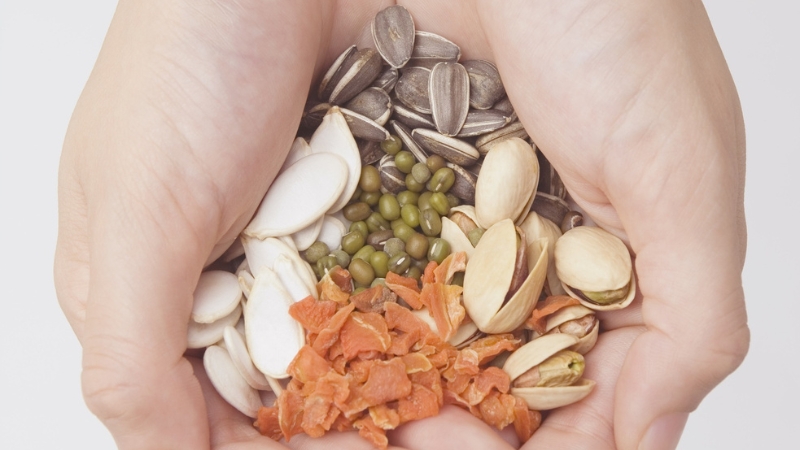
Seed cycling for hormones works through a fascinating process that our grandmothers never knew existed. According to Dr. Jolene Brighten, a naturopathic physician specializing in women’s hormones, “Seeds contain specific lignans and essential fatty acids that can help support the body’s natural hormone production and metabolism.”
The plant compounds in seeds can influence estrogen and progesterone levels by providing the building blocks our bodies need for healthy hormone synthesis.
Seeds contain phytoestrogens, which are plant-based compounds that can gently modulate estrogen activity in the body. Unlike synthetic hormones, phytoestrogens provide a gentler approach to hormone support.
According to research published in the Journal of Nutritional Biochemistry, lignans found in flaxseeds can help balance estrogen levels by binding to estrogen receptors when levels are too high or providing mild estrogenic support when levels are too low.
The omega-3 fatty acids in seeds play a crucial role in hormone production. Our bodies cannot produce omega-3s on their own, making dietary sources essential. According to the American Journal of Clinical Nutrition, adequate omega-3 intake can reduce inflammation that often disrupts hormone balance.
The anti-inflammatory properties of omega-3s help create an environment where hormones can function optimally.
Mineral content in seeds provides another layer of hormone support. Zinc, magnesium, and selenium all play vital roles in hormone production and regulation. According to the National Institutes of Health, zinc deficiency can significantly impact reproductive hormone levels, making zinc-rich seeds particularly valuable for women’s health.
Flaxseeds: Nature’s Estrogen Balancer
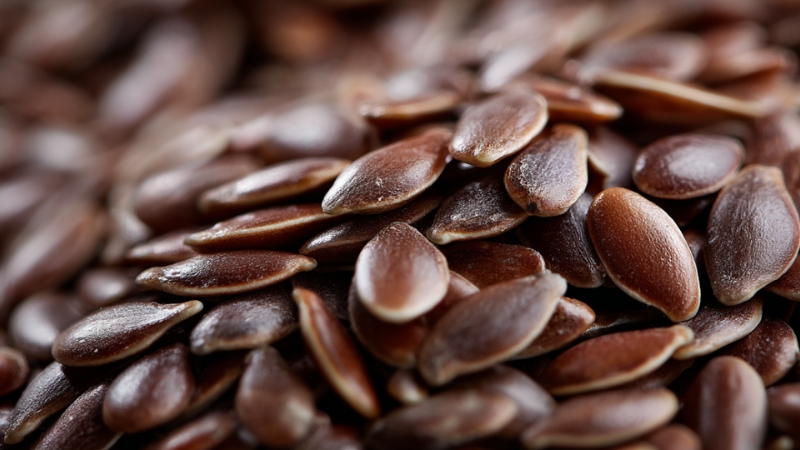
Flaxseed for estrogen balance has become my go-to recommendation for women dealing with estrogen dominance or irregular cycles. My morning routine now includes grinding fresh flaxseeds because the lignans are most potent when freshly ground.
According to research from the University of Toronto, women who consumed 25 grams of ground flaxseed daily showed significant improvements in cycle regularity within three months.
The lignans in flaxseeds can help metabolize excess estrogen, particularly important for women with conditions like endometriosis or fibroids. According to Dr. Lara Briden, author of “Period Repair Manual,” “Flaxseed lignans support healthy estrogen metabolism by promoting the production of good estrogens while helping clear harmful estrogen metabolites from the body.”
Ground flaxseed provides fiber that supports healthy elimination, crucial for hormone balance. When our digestive system functions optimally, our bodies can effectively eliminate used hormones instead of recycling them. According to the Harvard T.H. Chan School of Public Health, adequate fiber intake can reduce circulating estrogen levels by up to 15% in premenopausal women.
The omega-3 content in flaxseeds offers additional benefits for hormone health. Alpha-linolenic acid (ALA) found in flaxseeds can help reduce inflammation that often disrupts hormone production. My clients who incorporate flaxseeds consistently report improvements in PMS symptoms, particularly breast tenderness and mood swings.
Storage and preparation matter significantly with flaxseeds. Whole flaxseeds pass through the digestive system without releasing their beneficial compounds. I grind a week’s worth at a time and store them in the refrigerator to maintain freshness and potency.
Chia Seeds: Omega-3 Powerhouse for Hormone Health
Chia seeds and hormone health connect through their exceptional omega-3 content and remarkable nutrient density. Two tablespoons of chia seeds provide more omega-3 fatty acids than a serving of salmon, making them an excellent choice for women who avoid fish.
According to the American Heart Association, omega-3s can help reduce the inflammation that often underlies hormone imbalances.
Chia seeds excel at stabilizing blood sugar, which directly impacts hormone balance. Blood sugar spikes and crashes can trigger cortisol release, disrupting the delicate balance of reproductive hormones. According to research published in the European Journal of Clinical Nutrition, chia seeds can reduce post-meal blood sugar spikes by up to 39% when consumed with carbohydrates.
The fiber content in chia seeds supports healthy digestion and hormone elimination. Just one ounce provides 10 grams of fiber, nearly half the recommended daily intake for women. According to the Journal of Nutrition, adequate fiber intake can help reduce estrogen reabsorption in the intestines, supporting healthy hormone balance.
Chia seeds provide sustained energy without the blood sugar rollercoaster that can disrupt hormone production. I recommend soaking chia seeds in water or plant milk to create a gel-like consistency that slows digestion and provides steady energy release. The sustained energy helps prevent the cortisol spikes that can interfere with reproductive hormone function.
Calcium content in chia seeds supports bone health, particularly important for women as estrogen levels fluctuate during perimenopause and menopause. According to the National Osteoporosis Foundation, adequate calcium intake throughout life can help maintain bone density as hormone levels change.
Pumpkin Seeds: Progesterone Support Powerhouse
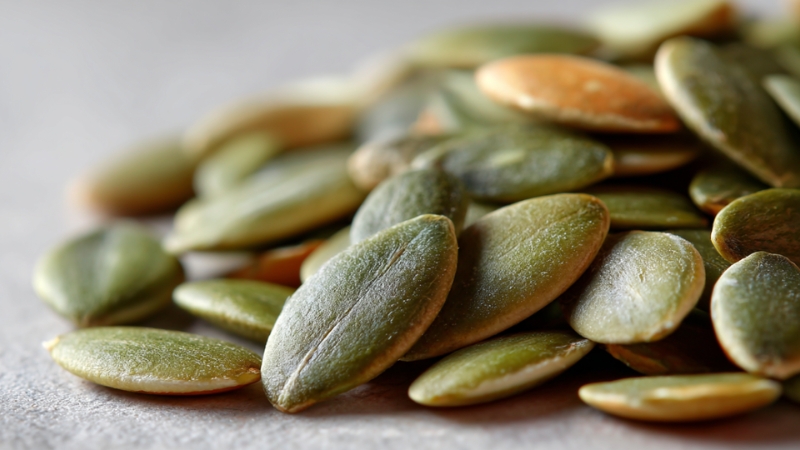
Pumpkin seeds for progesterone support became a game-changer in my personal hormone journey. The zinc content in pumpkin seeds directly supports progesterone production, making them particularly valuable during the luteal phase of the menstrual cycle.
According to research from the Journal of Reproductive Medicine, zinc deficiency can significantly impair progesterone synthesis in women of reproductive age.
Pumpkin seeds provide magnesium, which supports over 300 enzymatic reactions in the body, including those involved in hormone production. According to the American Journal of Clinical Nutrition, magnesium deficiency can worsen PMS symptoms and disrupt sleep patterns.
The magnesium in pumpkin seeds can help calm the nervous system and support restful sleep.
The protein content in pumpkin seeds helps stabilize blood sugar levels, preventing the cortisol spikes that can interfere with progesterone production. A quarter cup of pumpkin seeds provides 8 grams of protein, making them an excellent snack for hormone balance.
According to registered dietitian Kelly LeVeque, “Protein helps slow glucose absorption and prevents the blood sugar swings that can disrupt hormone production.”
Pumpkin seed oil has shown particular promise for women’s health. According to a study published in Climacteric, postmenopausal women who consumed pumpkin seed oil showed improvements in HDL cholesterol levels and reductions in hot flashes.
The compounds in pumpkin seeds may help support overall hormone balance during menopause.
Iron content in pumpkin seeds supports healthy circulation and energy levels, particularly important for women with heavy menstrual cycles. According to the Centers for Disease Control and Prevention, iron deficiency affects 19% of women of reproductive age, making iron-rich foods like pumpkin seeds particularly valuable.
Sunflower Seeds: Vitamin E for Hormone Regulation
View this post on Instagram
Sunflower seeds’ hormone regulation works primarily through their exceptional vitamin E content. One quarter cup of sunflower seeds provides 82% of the daily recommended vitamin E intake.
According to research published in the Journal of Nutritional Science, vitamin E can help reduce oxidative stress that often disrupts hormone production and balance.
Vitamin E in sunflower seeds supports healthy ovulation and corpus luteum function. According to fertility specialist Dr. Aimee Eyvazzadeh, “Vitamin E acts as an antioxidant that can help protect eggs from oxidative damage and support healthy hormone production.” The vitamin E content makes sunflower seeds particularly valuable for women trying to conceive.
Sunflower seeds provide folate, essential for DNA synthesis and healthy cell division. According to the National Institutes of Health, adequate folate intake is crucial for women of reproductive age. The folate in sunflower seeds can help support healthy hormone metabolism and cellular function.
The magnesium content in sunflower seeds supports adrenal function and stress management. Chronic stress can disrupt the hypothalamic-pituitary-adrenal axis, leading to hormone imbalances. According to the American Psychological Association, magnesium can help reduce stress hormone levels and support overall hormone balance.
Sunflower seeds also provide selenium, a mineral that supports thyroid function. According to the American Thyroid Association, selenium is essential for thyroid hormone production and metabolism. The selenium in sunflower seeds can help support healthy thyroid function, which is crucial for overall hormone balance.
Seeds That Support Menopause and Life Transitions
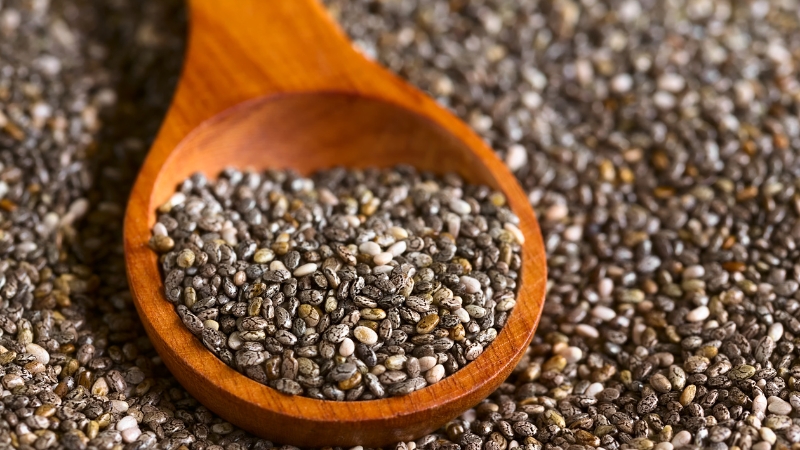
Seeds that support menopause become particularly valuable as estrogen levels naturally decline. Flaxseeds can help provide gentle phytoestrogen support during the menopausal transition.
According to a study published in Menopause, women who consumed flaxseeds daily showed significant reductions in hot flashes and night sweats compared to the placebo group.
The lignans in flaxseeds can help support cardiovascular health during menopause. According to the American Heart Association, estrogen decline during menopause can increase cardiovascular disease risk. The lignans in flaxseeds may help support healthy cholesterol levels and cardiovascular function.
Pumpkin seeds provide magnesium, which becomes increasingly important during menopause. According to research published in the Journal of Women’s Health, magnesium deficiency can worsen menopausal symptoms, including sleep disturbances and mood changes. The magnesium in pumpkin seeds can help support restful sleep and emotional balance.
Chia seeds offer calcium support, crucial for bone health during menopause. According to the International Osteoporosis Foundation, women lose up to 20% of their bone density in the first five years after menopause. The calcium in chia seeds can help support bone health during the transition.
Sunflower seeds provide vitamin E, which may help reduce hot flashes and support skin health during menopause. According to dermatologist Dr. Marnie Nussbaum, “Vitamin E can help support skin elasticity and hydration as estrogen levels decline.” The antioxidant properties of vitamin E also support overall health during menopause.
Addressing PCOS and Hormonal Conditions
@amramedicalcentre Dr amra lodhi gynaecologist ✨ AMRA medical center defense road Sialkot ✨ Sialkot… #amramedicalcentre #exercises #pcos #kneeosteoarthritis #diet #lifestyle #ovariancancer #ovaries #seedcylcle #flexseed #pumpkinseed #kneepain #physiotherapy #workoutfemale #exercises ♬ original sound – Amra Medical Centre
Best seeds for PCOS focus on those that support insulin sensitivity and androgen balance. Flaxseeds can help reduce androgen levels in women with PCOS. According to research published in the Journal of Food and Function, women with PCOS who consumed flaxseeds showed significant reductions in androgen levels and improvements in insulin sensitivity.
Chia seeds excel at blood sugar management, crucial for women with PCOS. According to the American Diabetes Association, insulin resistance affects up to 85% of women with PCOS. The fiber and omega-3s in chia seeds can help improve insulin sensitivity and reduce inflammation associated with PCOS.
Pumpkin seeds provide zinc, which can help reduce acne and support healthy skin in women with PCOS. According to dermatologist Dr. Joshua Zeichner, “Zinc has anti-inflammatory properties that can help reduce acne severity in women with hormonal imbalances.” The zinc in pumpkin seeds may help address the skin concerns common in PCOS.
Do seeds help with PMS is a question I hear frequently from women seeking natural solutions. According to research published in the Journal of Reproductive Medicine, women who consumed a combination of flaxseeds and evening primrose oil showed significant improvements in PMS symptoms compared to the control group.
The magnesium in pumpkin seeds and sunflower seeds can help reduce PMS symptoms, including bloating, breast tenderness, and mood swings. According to the American College of Obstetricians and Gynecologists, magnesium supplementation can reduce PMS symptoms in many women.
Creating Your Personal Seed Protocol
Seeds offer a simple and natural way to support hormone balance. Flax, chia, pumpkin, and sunflower provide nutrients that work best when consumed consistently and paired with other whole foods.
Small daily amounts, proper preparation, and patience make a real difference. Along with sleep, stress care, and movement, seeds can bring steady support through every stage of a woman’s life.
They are affordable, accessible, and powerful allies for long-term hormonal health.

